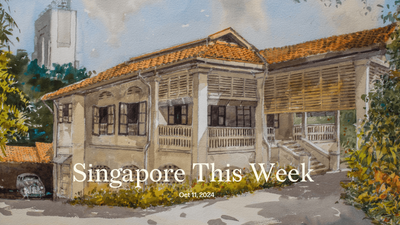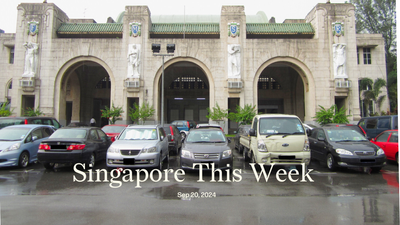Politics: Casino comrades
Last weekend, the ruling People’s Action Party (PAP) held its biennial conference at Resorts World Sentosa, a casino-entertainment hub. It featured the election of the party’s latest Central Executive Committee, an incestuous process described by one former diplomat as “the cardinals appoint the pope and the pope appoints the cardinals.” It also featured speeches by party leaders, notably Lee Hsien Loong, prime minister, and Lawrence Wong, the party’s chosen next leader, who spoke in Malay for the first time, drawing gasps from cadres who probably didn’t understand a word. (Tamil next?) More in keeping with the PAP’s brand of adversarial politics, their speeches emphasised to cadres, against the backdrop of an uncertain world, three recurring motifs: the opposition is made up of charlatans and opportunists; political diversity might lead to chaos; and single-party dominance is necessary for good governance, especially in times of crises (e.g. a pandemic). In this week’s op-ed, we examine whether the politics of fear still works.
Politics: Indranee Rajah and Grace Fu fumble around in Parliament
“Some newer politicians are less quick on their feet in countering, point by point, the opposition’s arguments in the House,” wrote Grace Ho, opinion editor at The Straits Times, on Monday. By Wednesday it was clear that even seasoned ministers are unused to debate. Indranee Rajah, second national development minister, said, in a phrase widely lampooned in memes, that it is “not meaningful” for the government to reveal the development costs of public housing projects. She gave no concrete reason why, though presumably the government doesn’t want citizens scrutinising its profits on “subsidised” housing. When pushed on two other issues—publishing an affordability index of mature estates and the valuation of reclaimed land—she simply had no answer, asking Pritam Singh, Workers’ Party chief (and leader of the opposition), to file separate questions, buying time, presumably, to seek help from her boffins. While Rajah was found wanting in content, Grace Fu, minister for sustainability and the environment, was found wanting in, well, grace. When hearing an alternative carbon pricing proposal from Jamus Lim, Workers’ Party member of parliament for Sengkang GRC, she jerked back derisively and sighed because she seemed not to comprehend Lim’s explanation of upper and lower pricing bounds. Worse, like a headmistress who’s lost her cool, she forgot that she had to return to her seat after speaking. Tan Chuan-Jin, the speaker of the house and her party chum, let her carry on. Singh was forced to interject to point out the impropriety to them. “I apologise for that, I will sit down,” Fu said.
Society: Food delivery is a hazardous job
What would many of us have done without food delivery riders during the pandemic? And yet it’s a wonder why anyone would want to work as one. Considered self-employed, these gig economy workers aren’t covered under the Employment Act, and hence aren’t eligible for basic labour protections, like leave entitlement, workplace injury compensation and employer Central Provident Fund contributions. They’re also accident prone, according to a survey by the Institute of Policy Studies. Of the 1,002 respondents, one third has been in at least one accident that required medical attention. While about nine percent have been in two and seven percent in three or more. Food delivery jobs have become an increasingly popular source of income for freelance workers since the pandemic. But the growing number of riders on the road has meant greater competition for a shrinking pie. While 3.2 percent of workers earn more than S$5,000 a month, 23.6 percent earn less than S$1,000. The respondents’ median monthly income of S$1,925 is less than half the national median monthly salary of S$4,680 in 2021. Given the fact that platform companies survive on the back of food delivery riders, isn’t it time that they are also held legally responsible for these workers’ safety and welfare? And as a customer, each time a rider delivers your order on time and still warm, remember that it took personal risk to put that food on your table, so that they could put food on theirs.
Society: Easing the journey to the gallows
It’s going to become harder for death row inmates to file last-minute challenges after all legal avenues have been exhausted. A new Bill proposed in Parliament aims to bar prisoners from seeking permission to file an appeal if they’re found to have abused the Court of Appeal’s process or have tried to delay or frustrate the sentence. Instead, if they want another day in court, they’ll have to first apply for permission to make a post-appeal application. In making their case, they’ll have to state the grounds for the challenge and prove that their application is based on new material not presented before. The court will then consider criteria like the prospect of success in making its decision. Under the new proposed procedure, only the Court of Appeal will have the right to hear post-appeal applications and grant stays of execution. But it will also have the discretion to allow challenges even if they don’t meet the requirements of the process. In a recent case, lawyer M Ravi had filed an application to the High Court seeking judicial review of the impending execution of his client, Nagaenthran Dharmalingam. After it was dismissed, he filed an appeal and a separate application to the Court of Appeal for a stay of execution. Both challenges were dismissed, with the court calling his case “baseless and without merit”, one that amounted to a “blatant and egregious” abuse of court processes.
Arts: Freedom Film Fest
After two years of virtual screenings, FreedomFilmFest (FFF) Singapore is returning as a weekend of films at The Projector. The Singapore edition of FFF is organised by Function 8, a civil rights group founded by activists such as Teo Soh Lung, a lawyer and ex-Operation Spectrum detainee. This year’s theme is “A Pandemic of Inequality.” The five events will feature a series of films and panel discussions on topics such as domestic worker rights and youth activism. Those curious about KC Chew, the subject of Jom’s most recent profile, can catch him speaking on the panel titled “Space and Spirit” on the challenges of keeping alternative spaces alive in Singapore. The festival takes place on November 19th and 20th, tickets are available on Eventbrite.
Arts: Night at the Library
The literary community is spoiled for choice this November. In addition to the ongoing Singapore Writers Festival, audiences can also look forward to the National Reading Movement’s Night at the Library. Some of the writers featured include poet and Singapore Literature Prize winner Marylyn Tan, nature guide writer Cheyenne Alexandria Phillips, and novelist Balli Kaur Jaswal. Fans of true crime might enjoy The Forensic Pathologist, a programme that puts crime writers Neil Humphreys and Liz Porter in conversation with forensic science experts Prof David Ranson and Dr Lee Chin Thye. Night at the Library is on from November 15th-19th. Admission is free but participants need to register in advance.
Arts: Fringe Festival
Since its inception in 2005, the M1 Singapore Fringe Festival has always been curated around a central and urgent theme. This year, however, artistic director Alvin Tan has taken a different approach, inviting artists to contribute work that addresses issues of importance to them. The performances announced adhere to the festival’s tradition of socially-engaged work: “Tree Confessions” (USA) and “Mother of Compost” (Australia) explore the climate crisis and “Kafka’s Ape” (South Africa) and “Less Than Half” (Singapore) both interrogate the meaning of equality in a deeply unequal world. Also of note is “Foreign Bodies” (Singapore), a play about the private lives of migrant workers. It’s presented by Birds Migrant Theatre, a company made up of migrant workers, in conjunction with Singaporean actors and directors. The festival will be held January 4th-15th 2023.
History weekly by Faris Joraimi
There’s been recent news about leading airliners recommissioning their A380s despite Airbus producing no new ones since 2019. The high costs of operating long-haul A380 flights mean they’ll likely play a humbler role than first envisioned for the “21st-century cruiseliner”. Once believed to herald a new golden age of jet travel, the A380 may suffer the same fate as the Concorde, developed by British and French inventors in the mid-20th century. The Concorde first took off in 1973, and SIA ran a service to London from 1977 jointly with British Airways. An engineering marvel, the Concorde (like its Soviet sibling the Tupolev Tu-144) travelled faster than the speed of sound: flying from London to Singapore took just 9.5 hours, including a short stop in Bahrain. A transatlantic crossing from Paris to New York was shaved from eight to just 3.5 hours. Speed aside, the Concorde was an elite experience. Passengers were served gourmet meals with champagne on board, and got a certificate boasting that they “flew supersonically”. All this didn’t come cheap: a one-way ticket on the Singapore-London route cost more than S$10,000 in today’s money. But it never turned a profit, and Singapore’s supersonic dreams ended in 1980. By the early 2000s, accidents and technical issues made it clear the Concorde was not viable. In its brief decades of service, however, the Concorde was a futuristic symbol of travelling with style and glamour, accessible to the few who could afford it. I’d still much rather go anywhere by train.
Tech: The Big Tech downsizing—learn from Stripe, not Twitter
The hiring frenzy that resulted from pandemic-induced growth is now being reversed amid an economic downturn. Stripe has cut 14 percent of its workforce, dropping its headcount from around 8,000 to nearly 7,000, with most of the layoffs in South-east Asia. Patrick Collison, the fintech major’s CEO, has assured retrenched employees that they will be taken care of and receive severance pay, bonuses, healthcare, and extensive career support, among other benefits. This is in stark contrast to Twitter's callous approach, albeit the downsizing having more to do with the latest takeover and accompanying debts than economic concerns. Elon Musk, Twitter's new owner, fired its top executives and laid off 3,700 employees—almost half its global workforce—a week after taking over, citing US$4m dollars (S$5.6m) in lost revenue per day as the main reason for the decision. It remains unclear how many in Singapore were laid off. The abrupt layoffs sparked fear and outrage, and have led to lawsuits as the notice does not allow employees enough time to transition to their next role. Reports of laid-off employees being asked to return after being fired by mistake have led to further confusion. Earlier this week, Facebook’s parent company, Meta, also announced plans to conduct layoffs beginning November 9th. With an unprecedented surge of layoffs since its inception, Meta can undoubtedly learn from Stripe. There is no good way to do a layoff, but companies can at least show compassion, treat its workers as humans first rather than dispensable cost centres, and not rub any more salt into the wound.
Tech: Public listing 101
An IPO is not the only path to a public listing. MoneySmart Group intends to list on the Singapore Exchange (SGX) after completing a US$161.7m (S$226.5m) reverse takeover of real estate developer Asia Pacific Strategic (APS) Investments. Founded in 2009, the MoneySmart Group is South-east Asia’s leading personal finance portal, helping consumers compare loans, insurance, and credit cards. The company raised US$10m (S$14m) for its Series B round in 2017 led by Japanese web group Kakaku before the reverse IPO deal. A reverse initial public offering (IPO), also known as a reverse takeover (RTO) or reverse merger, is a process whereby a small private company like MoneySmart Group becomes public without going through an IPO but by acquiring a larger, publicly listed company like APS Investments. Compared to special purpose acquisition companies (SPACs), RTOs are more costly in transaction fees and require more due diligence. An RTO also acquires publicly listed companies that have an operating history, while a SPAC acquires a clean company. In June, SGX said that it’s planning to court more start-ups through its NYSE partnership to drive dual listings from trans-pacific companies. It’s also conducting talks with China and South-east Asia issuers. With the global IPO market having lost its fizz, forcing start-ups to delay listing plans, the aforementioned developments surely raise the spirits of local investors.
Tech: SG proptech firm propels its largest property deal
Propseller, a Singapore-based proptech firm, has closed a US$14.5m (S$20.3m) property deal in Sentosa Cove, marking the company’s largest deal to date. In a Linkedin post, Adrien Jorge, Propseller’s founder and CEO, said that the deal marks its entry into Singapore’s top 50 residential transactions of 2022, and that the revenue made was as much revenue in a single day as they've made in their first 501 days as a company. Founded in 2018, Propseller is a tech-enabled real estate agency that combines a tech platform with in-house salaried agents. For every transaction made, the company charges a one-percent commission fee which is half the market rate in Singapore. The cost savings are made possible by digitising and automating an agent’s typical work. The firm was established by Jorge, who previously served as Groupon Southeast Asia general manager. Propseller raised US$12m (S$16.8m) in a series A funding round led by Vertex Ventures Southeast Asia and India in August of this year.
If you enjoy Jom’s work, do get a paid subscription today to support independent journalism in Singapore.







